- Home
- Andrew McGahan
The Ocean of the Dead: Ship Kings 4 Page 3
The Ocean of the Dead: Ship Kings 4 Read online
Page 3
‘And if Diego attacks us by darkness?’
Boiler Swan said, ‘I do not know this Diego as well as some of you, but even if he is as untrustworthy as report makes him, what would be the point of attacking by night? If he sought our destruction, surely he had his best chance this morning – and he let it pass.’
Jake sighed. ‘Truly spoken. Though damned if I know why.’ He hunched his shoulders under his upturned collar and glanced sourly to the sky. ‘Very well, let’s stand the crews down. At least we can all get below to some hot food and blankets, and out of this infernal cold!’
The former innkeeper snorted. ‘You think this cold? Back home in Stromner we’d call this no more than a bracing evening, and not even raining.’
Jake, born of the tropics, shook his head in disgust. ‘You New Islanders and your miserable weather . . .’
Fidel was smiling. ‘What do either of you know of the cold, who have never seen the Ice, as Dow and Nell and I have? But enjoy the cool while you may, Boiler. Where we’re going, you’ll see all too little of it.’
Watching on through this, Dow was aware of a momentary satisfaction: these three flung-together souls – a Ship Kings officer, a Twin Islands harpooner, and a New Island innkeeper – had forged themselves, over the last ten months, into a comfortable and orderly command unit. A captain could not ask for better. He was particularly proud of Boiler, who had proved to be not only a natural leader of men, but a natural sailor too, as if some New Island captain of old lay forgotten in his ancestry.
But the thought passed swiftly, chased by a more sombre one. Fidel’s comment was telling. The Doldrums with all their heat and torpor lay ahead now. Indeed, Dow had to remind himself once again that they were in fact embarked at last on their true voyage. The occasion should really be marked by some action on his part – a speech, a toast, a solemn swearing of their intent. But he said nothing. In truth, he could not yet feel they were properly begun, not while those distant ships trailed them.
What was Diego up to?
*
Nell was silent throughout the discussion, oddly distant. She went below immediately after Jake and Boiler’s departure, pleading a headache to Dow – she would lie down awhile, she said – and did not appear at dinner in the Great Cabin. Dow himself returned to the high deck after eating, and stayed there some hours into the deepening night, watching Diego’s fleet over the stern. The six enemy ships were well illuminated, making no attempt at concealment, and seemed to be keeping their distance as they had through the day.
And yet . . .
Dow waited, uneasy. It became colder still. Absurdly cold. He shivered, staring up at the night sky. It was piercingly empty and clear, but behold: a bright ring surrounded the waxing moon, so bright that it seemed to have colours within it, like a pale rainbow. Dow had never seen anything quite like it. An omen? On this, their first night launched upon their quest? But why this icy apparition, when they were headed somewhere so hot?
He shook his head. It was some quirk of the weather, that was all. He knew better than to look for omens in the sky. Abruptly, the ship’s bell was tolling midnight. Dow stared back to the Valdez fleet once more. The six pinpoints of light sailed on steadily, holding their station. Enough. Diego wasn’t going to attack, and it was too cold to linger idly on deck; Dow didn’t have his full winter under-gear on, it was still stowed away in his trunk. With a terse nod to the officer on watch, he went below, descending by the inner stairs to the Great Cabin.
It was far warmer here, for the windows had all been shut with the advent of the cold change, and the day’s earlier heat still lingered, glowing subtly from the wood grain of the walls and the leather of the armchairs. A junior lieutenant was snoring on one of the couches, a book fallen on his chest, but otherwise the cabin was deserted and silent and dim.
It was merely the warmth of the room, perhaps, but Dow was struck – as he sometimes still was, even after so long – by the fact that this was his Great Cabin now. His ship. He paused a moment to consider the rich fittings and furniture, moved by a mixture of pride and wonder – and doubt, too. At last his gaze came to rest on the great centre beam of the ceiling, and on the words engraved upon it, once no more than faint suggestions, but since painted over in gold.
Grey Sail.
It was the ship’s true name, its first name, discovered on the fateful day that Dow became captain. Indeed, some had argued – back in Stone Port – that the Chloe should be known as the Grey Sail yet again. But Dow, in honour of Vincente of the Shinbone, had refused the suggestion. For by then he had heard at full length, told by Fidel, the terrible tale of the younger Vincente and the feud that won him the vessel, and of the subsequent tragedy of his beloved wife, Chloe, betrayed to an untimely death, along with their infant child.
The Chloe the ship remained. But here at least, in the Great Cabin, Dow had let the vessel’s old name stand, and he took reassurance from it now, and from the link it gave to his ancestor, Honous Tombs. Yes. This was his ship. It had been preserved for him through time by many unlikely chances, until he could inherit it from his forefather. What else could such a miracle signify, other than that by presenting him the Grey Sail, fortune had revealed its plan for Dow in plain sight; that after all the years of hints and mysteries, the wheel of his fate had turned and clicked sweetly into proper place?
That he was meant to be doing this?
The lieutenant on the couch started awake with a snort and the book fell to the floor. His thoughts broken, Dow strode off through the forward doors, passing down the passageway until he came to the threshold of the captain’s cabin. Vincente’s cabin. Honous Tomb’s cabin. Diego’s cabin too, once, and who knew how many other officers’.
But Dow’s cabin now.
And Nell’s.
It was a first, Dow assumed. In the long line of the Chloe’s commanders, surely none before had shared these quarters with a partner. But of course the entire vessel was filled with husbands and wives and families now, as it had never been before. Not merely a battleship any longer, but an ark . . .
He entered the cabin quietly, and was greeted by a single lamp burning dimly in the day room, the curtain to the alcove beyond drawn across a deeper darkness – Nell must be long asleep within.
Dow paused to remove his coat, and then, sitting gratefully on a stool, took off his shoes, feeling the weight of the day and the burden of the captaincy slip from his shoulders. What a refuge the cabin was – warmer again than the Great Cabin on this chill night, and even more comfortably appointed, and, as always, so private.
The privacy, no doubt, was something that every captain who had ever dwelt here had enjoyed. But Dow had to admit that in terms of fittings, the cabin was not as he had first seen it, on the day he had visited Captain Vincente here.
Then, it had been bare and stern, spurning luxury, quite in keeping with Vincente himself. But afterwards the ship had passed to Diego, who was a different kind of officer entirely. In fitting out the Chloe to his own tastes, Diego had spurned no luxury whatever, even in a time of war. When Dow had entered the cabin after capturing the ship, he had barely recognised it as the same room, so crowded was it with ornate chairs and couches and footstools, all gathered about a great marble-topped desk, the floor hidden under thick rugs, and the walls bedecked with works of art in gold frames.
Much of this clutter Dow had ordered removed, but he had kept one of the rugs – it made moving about quieter, and this was a shared cabin now, after all – and also one of the less garish couches; for his own tastes, while hardly as grandiose as Diego’s, were neither quite as bare and hard as Vincente’s. The marble desk he had replaced with a plain table, and the walls were free of decoration once more, bearing only clothes hooks, and shelves, and one bookcase, installed by Nell and filled with volumes that she thought fit for Dow as his reading ability progressed.
That was the day room. Hidden behind the curtain was the sleeping alcove, basically a large snugly enclosed bed, bui
lt with sideboards high enough to prevent its occupants from toppling out when the ship was rolling. If the swell was particularly bad, there were also hooks set in the ceiling, where two hammocks could be strung. And lastly, opening off the alcove, was a washroom, boasting a fine basin and mirror, and also – another of Diego’s luxuries that Dow and Nell could not bring themselves to remove – a bronze bathtub. This last was usable only in dead calms or in port, but still . . .
Dow rose from the stool, took up the lamp, dimmed it further, then carefully pushed the curtain aside to look in, expecting only to see Nell’s shape huddled sleeping beneath the covers.
Instead, she was sitting up, wide awake.
‘Sorry—’ he began.
He realised Nell was not awake at all. Nor was she merely sitting up, she was frozen stiffly erect, her back arched, her simple nightshift stretched taut across her chest; and though her eyes were wide open, they were sightless, rolled up to expose the whites.
It was happening again!
Dow rushed to her. ‘Nell,’ he hissed, clutching her arm, which was clamped rigidly to her side. ‘Wake up. Wake up.’ There was no sign that she heard him, so he did what he had done before in these situations: namely, slapped her across the face. ‘Nell, wake up now!’
She shuddered vastly, and groaned, stiffening and arching even further. Then abruptly her eyes rolled to normal again, and she slumped forward with a cry. A wild moment of struggle followed, where she did not seem to know who and where she was – but Dow was holding her now, and whispering her name, and after a moment’s frenzy she calmed.
‘By all the deeps,’ she whispered hoarsely at last. ‘Not again. How long was I out for?’
‘I don’t know,’ Dow confessed. ‘I only just came in. But it’s after midnight. What time did you go to bed?’
‘I don’t remember.’ She shifted in his arms. ‘Oh . . . that hurts. It might have been hours this time.’
Dow was cautious. ‘Did you . . . dream . . . again?’
For this was the nub of it. Ever since Dow had assumed the captaincy, and declared his purpose of crossing the Barrier Doldrums, these strange, rigid fits had begun to visit Nell, possessing her randomly during her sleep, the phenomenon growing worse as the months passed. But it was not just the fits themselves, it was the dreams that came with them. The nightmares.
Her narrow brow was creased. ‘There was something . . . something that was chasing us, something we were dragging behind us, running away from it, but pulling it along at the same time.’
‘What something?’
‘I don’t know. Like an anchor dragging, or a lifeboat hanging from the stern. Something we couldn’t shake loose. I can’t remember what it was exactly . . . but it was awful.’ She grew urgent, fearful. ‘We have to find out what it is, Dow! Cut it loose, before it’s too late!’
Dow frowned as he held her. It was always like this. When she woke from the fits, she could never recall what her nightmares had been about, only that they filled her with dread and with a sense of impending disaster. But whether she could recall the details or not, Nell was convinced of one thing: that her nightmares were visions of events that lay ahead.
Warnings of the future.
Prophecies.
A true scapegoat you will become.
The words sounded in Dow’s head even now, spoken long ago by the mysterious Axay. Did Nell remember them too? If so, she had never mentioned it, and Dow in turn had never raised them with her.
But was this what the words meant? That Nell would one day begin to receive visions, portents of the future, such as Axay had done? But surely foresight was something that a person was born with, innate to them always. Nell had never displayed prophetic abilities before. Could someone develop these talents later in life? And even if such a thing was possible, why would it be like this, so vague, so confusing? What was the use of Nell having visions if she could never understand them?
He said, ‘It’s nothing, I’m sure. You were probably just dreaming about Diego following us tonight.’
‘Maybe.’ She had calmed again, but there was no belief in her voice.
Dow persisted. ‘I mean, he has been like an anchor hanging behind us. But we’ll be rid of him soon.’
Again, ‘Maybe.’
She sounded exhausted now, drifting, and Dow lay her back, wrapping her in one arm, and arranging the blankets so that she would be comfortable. Sleep always came fast after these episodes, an unconsciousness that could last for twelve hours and more. Docile, Nell let herself be tucked in, and in only a few minutes more her breathing was deep and peaceful.
Dow, however, remained wide awake. He waited, alert to her every movement and sigh as she wandered in friendlier dreams, or at least what he hoped were friendlier dreams. Perhaps an hour passed, and by rights his arm should have been getting tired from holding on. But in truth, there was hardly any weight to her. She was so slight, so insubstantial, for all her inner strength. It was hard sometimes to know if he held her at all.
A sentiment – Dow mused, staring into the dark – that was all too fitting where he and Nell were concerned. Even after a year together, most of it sharing this very bed, and for all that he did not doubt her love for him, he still often felt like this – sensing that some essential part of her remained light and ungraspable and beyond his reach; that the bond between them, for all its power and pleasure, was forever fleeting, and ephemeral . . .
Once, months ago now, as the Chloe and the Snout had been voyaging upon the high seas towards the Twin Isles, on a cold, gale-blown night, huddled in this bed, he had wondered aloud if the two of them should get married – maybe for no other reason than to allay this unease in his heart. He did not truly care if they were married or not: whatever the nature of their bond, a word would not change it. But the idea had bubbled up without conscious thought. And after all, why not? Other people got married, why shouldn’t he and Nell? It would even be good for morale upon the two ships, a wedding . . .
But Nell had taken his light words with a far deeper seriousness, and holding his face in her hands, she had refused. ‘No, Dow. That’s not the life before us. Husband and wife, mother and father, grandfather and grandmother one day. That’s for other people. For us . . . for us it will always be different.’
Dow had stared back, not bothered by her rejection of marriage, but chilled by the vision she held of their future. Himself, he had not thought so far ahead as to any children they might have, let alone grandchildren. But to have it all summarily summoned and then rejected by her, her voice so faraway and sad . . .
‘What’s wrong?’ he had asked. ‘Where’s this coming from?’
She had shaken her head and held silent a moment, listening, it seemed, to the howl of the wind from topside, and the creaking and slamming of the ship, and over all, the ever-present roar and hiss of the ocean. ‘The sea claimed us long ago, Dow, and out here, in the cold and on the waves, there’s no place for marriage or children. And yet that’s where we will walk.’
That’s where we will walk.
Remembering the statement now, holding Nell as she slept, Dow felt the chill afresh. For something in her tone suggested that she did not mean they would walk together. Not always. Not for all time.
Yes, that was the deepest unease that haunted Dow: that he would lose her somehow – and that somehow the loss would be connected with this attempt of theirs upon the Barrier. Oh, assuredly, it seemed that fate had ordained that the Doldrums must and would be crossed – but if Dow’s life had taught him anything, it was that fortune was never to be blindly trusted. There was always a price, and the greater the apparent gift or reward, the greater the true cost.
If he could have been sure that such a cost would fall on his own head, he would have accepted it gladly enough. But from the very moment he had declared the great challenge, he had dreaded inwardly that it was not himself who would pay the final price. It would be their scapegoat. Their true scapegoat.
It woul
d be Nell.
Not that Dow had voiced such fears to Nell herself. She would, he knew, only be insulted by them, for she was not a child to be worried over, or an innocent to be feared for. She was his equal in this enterprise, as committed to its success as was he – if not more so – and bore an equal share of its dangers. If there was a price to be paid, and if indeed it was Nell who was to pay it, well, wasn’t that her choice and her right as much as it was Dow’s? Even if the cost was separation and loss? Even if it was death?
Yes, it was her choice.
Yes, it was her right.
So why did his heart quail? Why was he so sure that neither of them truly understood yet just what the cost might be?
Not even death, maybe.
But something worse?
In her sleep Nell moaned sharply, and for a moment struggled in Dow’s arms, as if fighting an enemy in her dreams. He held on and whispered soothing words, and soon she fell still again.
But Dow himself could lie still no longer. Slowly he disentangled himself, then folded the sheets carefully around her, hiding the patterns of red scars on her bare limbs – the patterns that had become such a familiar map to his hands. She frowned severely in her oblivion, but in time the frown softened, her brow smoothed out, and at length she began to snore lightly.
He waited awhile longer even so, crouched at her side, feeling the slow, steady movements of his ship beneath him, and listening to its many creaks and mutters. At last he rose silently and slipped out into the day room. There he dressed again, then passed out into the passage and so on up to the high deck. All was calm there. The night was deeply cold and clear, and Diego’s fleet was still visible far behind, as promised. But Dow remained anyway, watching the distant lights, till dawn came.
*
By early afternoon, the weather still crisp, the strange procession had run its course. The last high point of land had vanished north and westward, signalling the limit of Ship Kings waters. In recognition of this, the six Valdez vessels, having held their distance tamely for the last thirty hours, now came sweeping up with a formidable dash, but with their gunports closed, and with white flags of parley flying from their mainmasts.

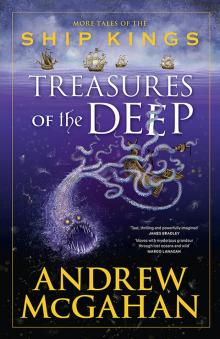 Treasures of the Deep
Treasures of the Deep The Rich Man’s House
The Rich Man’s House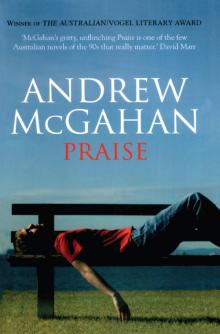 Praise
Praise The White Earth
The White Earth 1988
1988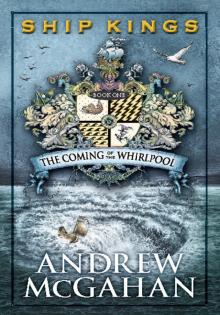 The Coming of the Whirlpool
The Coming of the Whirlpool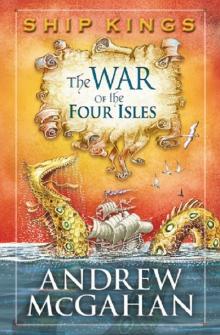 The War of the Four Isles
The War of the Four Isles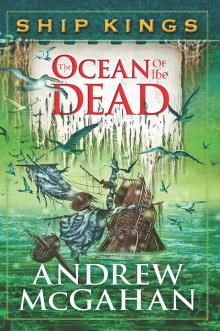 The Ocean of the Dead: Ship Kings 4
The Ocean of the Dead: Ship Kings 4 Last Drinks
Last Drinks Wonders of a Godless World
Wonders of a Godless World Underground
Underground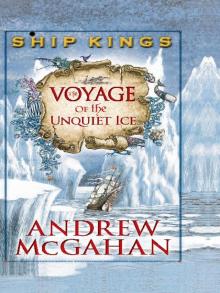 The Voyage of the Unquiet Ice
The Voyage of the Unquiet Ice